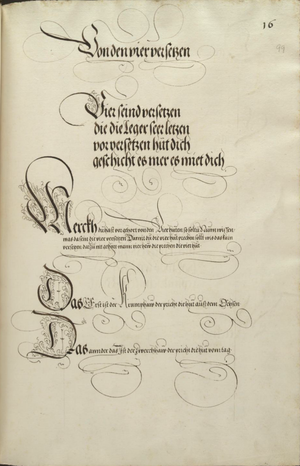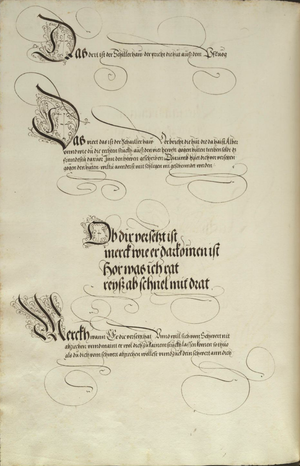|
|
You are not currently logged in. Are you accessing the unsecure (http) portal? Click here to switch to the secure portal. |
User:Kendra Brown/Latin Lew/90v
< User:Kendra Brown | Latin Lew
Jump to navigation
Jump to search
Revision as of 03:47, 8 March 2021 by Kendra Brown (talk | contribs)
Munich 90v / PDF page 26
Contents
Missing Zettel verses from Dresden 99r (35)
German
- Vier seind versetzen
- die die Leger seer letzen
- vor versetzen hut dich
- geschicht es mer es miet dich
English (Fritz)
- There are four settings aside
- that are very damaging to the Leger.
- Guard yourself from the setting aside;
- it is troublesome if it happens.
90v a
90v a Latin
- SEQUUNTUR QUATUOR
- Ictus quibus omnis generis habitus et castra repelluntur,
- atque in nihilum rediguntur.
- In superioribus dictum est de quatuor custodijs,
- iam igitur doceberis,
- quae principales formae sint,
- quibus hostis impetus retardantur,
- quarum sunt ictus quatuor.
90v a English
- The following four
- strikes by which any gestures and camps born in all ways are repelled,
- and in nothing are driven back.
- In the above it is stated about the four guards,
- now therefore I will teach,
- which would be the principal forms,
- with which the forward attack of the enemy is delayed,
- of which the four strikes are.
90v a notes
90v b
90v b Latin
- Primus est, qui Curuus dicitur,
- cuius supra mentio facta est,
- is removet habitum,
- vel custodiam Bovis.
- Secundus. Transversarius,
- qui custodiam de die repellit.
- Tertius, qui à limis oculis appellationem sortitus est,
- is custodiam Aratri disrumpit.
- Quartus is est Ictus,
- quo vertex capitis adpetitur,
- qui custodiam Populi, ut nos Germani vocamus, repellit.
- quo autem modo certiores habitus ex praedictis Ictibus sint formandi,
- et qui habitus sint contra custodias,
- supra descripti sunt in Ictibus,
- quare si plagas cavere velis,
- nullos alios preter hos exerceas.
90v b English
- The first is that which is called Curved,
- of which it is mentioned above,
- it shifts the posture,
- or the guard of Ox.
- Second. the transverse,
- which repels the guard of the day.
- Third, which gets the name from side-eye,
- it disrupts the guard of Plow.
- Fourth is the Strike,
- which seeks the crown of the head,
- which repels that guard which our Germans call Poplar.
- In which way, however, certain conditions would be formed out of the preceding Strikes,
- and any who would be in a position against the guards,
- the above are described in the Strikes,
- for which reason if you wish to hit to cut through,
- practice no others besides these.
90v b notes
Missing Zettel verses from Dresden 99v (36)
German
- Ob dir versetzt ist
- merch wie er darkomen ist
- Hor was ich rat
- reÿsz ab schnel mit drat
English (Fritz)
- If you have been displaced,
- note how it came to pass.
- Hear my advice:
- Pull quickly away in a rush.
90v c
90v c Latin
- CAUTELA OBSERVATIOQUE,
- quid agendum sit,
- si hostis impetum exceperit,
- atque ab ense tuo removere suum nolit.[^1]
- SI adversarius Vim tuam sibi illatam exceperit,
- nec ensem ab ense tuo removere volet[^2],
- verum conatur,
- ne ullos habitus queas exercere,
- tunc tum quasi ensem retrahere volveris simulabis,
- et usque ad medium attrahas,
- eo post celeriter sublato,
- caput eius acie brevi,
- vel habitu duplationis concutito.
90v c English
- Caution and Observation,
- which will have been done,
- if the opponent would take out the forward attack,
- and doesn't want to shift away from your sword.
- If the adversary would take out your Strength bearing it in[^3] for himself,
- neither does he want to shift away from the sword,
- truly he tries,
- nor(?) are you able to employ any actions,
- then next you will pretend as if you wanted to pull back,
- and you should drag together up to the middle,
- afterwards, having lifted it quickly,
- strike his head with the short edge,
- or in the gesture of doubling.
90v c notes
- [^1]: This bit is an attempt at translating the Lichtenauer verse. In the MS, it's all written on two lines--the line breaks here are artificial based on punctuation.
- [^2]: this appears to have been written first "nolet" and then over-written with a diagonal lower connector and a heavy curl-mark (as is used elsewhere/in other hands to indicate u). other u/v characters on this page don't have the curl mark, which could indicate it was added here to clarify the correction.
- [^3]: illatam is il + latam -- latam is a form of ferre (bring, bear, carry off, get) and il is a form of in
90v d
90v d Latin
- ALIA FORMA.
- QUUM adversarius impetum removerit tuum,
- sursum ensem ab ipsius gladio vellito versus mucronem ipsius,
- quasi superné excepturus,
- verum ensem non removeas,
- at ita haerens ab ense rursus caput eius ferias.
90v d English
- Another form
- When the adversary has set your forward attack aside,
- extract the sword from on high from his sword toward his sword,
- as if you will take it out from a higher level,
- in truth, you would not shift the sword,
- but therefore, adhering to the sword, you would strike his head.


